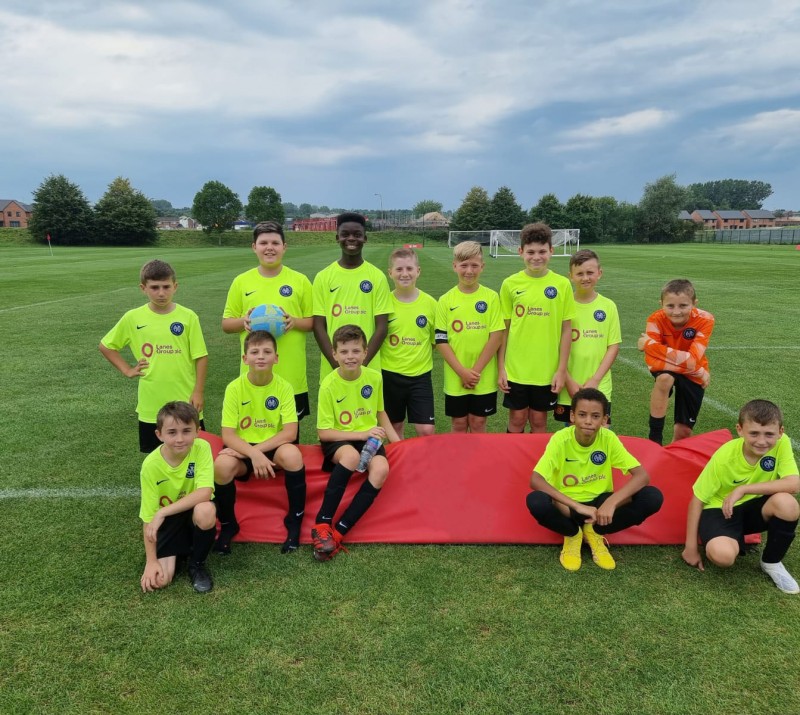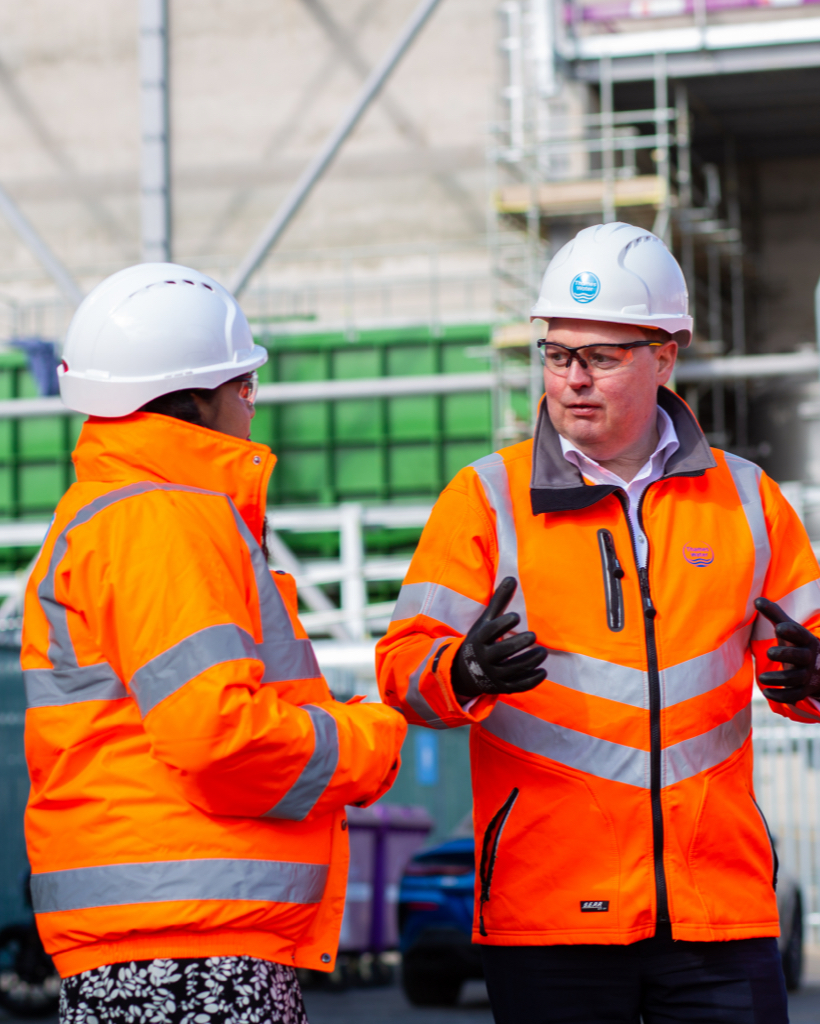Junior football – how everyone can be a winner

The Premier League may be the pinnacle of football in the UK. But thousands of junior clubs across the UK are the vital grassroots and, arguably, lifeblood of the sport.
Lanes Group plc is sponsoring an under 12s team at Parkwyddn Junior Football Club, in Salford, Greater Manchester.
We’re taking the opportunity to hear from the Under 12s Predators Team Coach and Club Secretary, Colin Farn, about what the club means to its players, their families, and the wider community. And about some of the challenges the club faces as it looks to the future.
When was Parkwyddn JFC formed and how many teams does it have?
The junior football club was founded in 1987, as part of Parkwyddn FC, which was founded in 1962. The junior club has gone from strength to strength and now has 22 full teams and a soccer school, with 256 players registered.
The soccer school is for children aged between 4 and 7. We also have teams up to under 15s, and an open age 18+ team. Up to under 12s we have mixed teams, boys and girls. We started our first under 12s girls team last season.
We have 30 coaches and assistant coaches. As well as the coaches, we have six committee members, including a club welfare and safeguarding officer.
Do you cater for young people with disabilities?
Although we don’t have any pan-disability teams at present, we welcome everyone to the club. If we can’t provide a team, our committee members will make sure we can help find one. If we had enough interest it is definitely something we would move forward with.
Where are matches played?
Matches are typically played on Saturday and Sunday mornings. Our home pitches are at Patricroft Recreation Ground, Eccles, Manchester, M30 7AW. We have five-a-side, seven-a-side, nine-a-side, and 11-a-side pitches, as well as a fully enclosed pitch on a converted bowling green in front of our clubhouse.
How did you get involved with the club and how has that involvement progressed?
I initially got in touch with the club when my, then, 5-year-old son came home from school with a flyer for the Parkwyddn JFC soccer school. I took him along and he absolutely loved it. It was all aimed at fun and being involved, socially, while learning the basics of football.
When my son was six he graduated from the soccer school into an under 7s team. The coach who ran the team asked if anyone wanted to help out. It was something so far out of my comfort zone, but I decided to give it a go.
The club organised and paid for my security check (DBS) and my FA Level One course, which includes safeguarding and first aid. Once all my certification was in place, I joined the team as assistant manager.
When the team got to the under 9 age group, the manager was stepping down to spend more time with his young family and I was asked to take over the team, which I did.
One of the player’s parents did his courses and checks and then he joined as the team’s assistant coach. We are now at Under 12s with most of the original team still with us, and we are competing at a medium to high level of football.
What do you get out of being a team coach?
I’ve got different things out of coaching through the various age groups. When the boys first started, I really enjoyed teaching them the basics, how to pass, shoot, tackle, save. To then see this successfully put into practice in a game is a great feeling.
As the players have got older I’ve really enjoyed watching them grow as a group. A lot of them go to different schools, but they keep in touch away from football and they all get together socially outside of training and matches. I really enjoy seeing this friendship group progress as it reminds me of when I was younger. They have also developed into a very strong football team.
How important the club to communities in Salford?
Parkwyddn JFC is hugely important to the local community. The club brings so many people together. The players, their parents, families, different cultures, sexes, religions, backgrounds.
The thing I hear the most is about kids who feel they have nothing to do or nowhere to go at weekends or in the evenings so they end up either roaming the streets or staring at a screen all weekend.
I have seen first hand across many of our teams how young kids can go from being quiet and shy, and lacking in motivation, to kids who are having fun, making friends – which they will keep for a lifetime – and developing into young adults their parents are proud off and who are proud of themselves.
The club gives these young people the platform to learn and develop something they love doing in a safe and fun environment.
How does this community value show itself?
The parents and families see the impact that being part of this club has on their children, and it has helped to make the club feel like a family, if that makes sense.
Lots of parents help out, and I know a lot of the teams arrange social activities outside of the club. For example, one of our teams does a local parkrun 5k funrun at the weekends with players and parents joining in, so the whole family gets the benefit of outdoor exercise.
We’re seeing more involvement from parents and the local community. The club is something they’re proud of.
What are the key benefits for individual players and their families of being involved in the club?
The club is well respected in the local area, having been established since 1987. A lot of the parents of our players used to play or be involved in the club themselves, so we have a second generation of players from the same family. The club has a family feel to it, and players and families can get support on issues outside football, if required. The parents of the team I coach have a WhatsApp group and I know that becomes a bit of a social and support hub at times.
Can you explain a bit more about these benefits? Are they related to physical health, wellbeing, confidence, instilling of values?
The most obvious benefit would be the improvement in physical health. But I feel this is not necessarily the most important. All our coaches are FA-qualified. Between us all we have many years of experience. One thing I have learned is that no two players are the same. This isn’t just related to ability. It’s also how they are personally and emotionally.
The loud and confident player can sometimes be worried about something or might really need someone to offer that bit of praise when everyone assumes they don’t need it. Each player responds in a different way and has different needs.
I believe values that we instill at the club are very important going forward. We give individuals every opportunity to shine and express themselves. We are also very much about creating a team bond and team spirit. It’s one of the most satisfying things to see when the team works together and they look after one another.
Would you say the club has had a particularly positive impact on some participants?
Yes, 100%. I’ve seen young people who were getting into trouble at a very young age, and it was affecting school, friendships and families. I have genuinely seen kids come to this club and within a short space of time they are an important member of the team and they have a much better attitude and outlook.
How can you tell the club, and playing sport, is making such a difference?
I have seen at least 2 or 3 players who have come to the club to try it out as a way, purely to make friends. Either because they are new to the area or to the country, or because of other circumstances.
Everyone is welcomed in the same way, which is something we’re very proud of. I’ve seen a frightened looking boy walk in and not want to say a word to anyone. Once 2 or 3 training sessions go by, you notice him calling for a ball, having a joke with one of his new team mates.
Before you know it, he has a new group of friends and his personality starts to come out. You never fully know what people are going through behind closed doors. People of all ages go through different struggles at different times. Our firm ethos is to support everyone at the club, so they have a positive experience and room to grow.
Does the club have a positive impact on other aspects of participants’ lives?
A lot of the kids who play for our team have gone on to get involved with school football teams and other sports. There are a few of the boys who met and developed long-term friendships at Parkwyddn long before they went to high school. My son told me this helped him settle in to senior school because, in the first few days, there were more friends and familiar faces.
Personally I also think that being part of a sports team outside of school gives young people a lot of confidence, enthusiasm and self-belief in other tasks and activities, which can only have a positive effect as they continue their education and enter the world of work.
Is there also a benefit for parents or guardians and volunteer helpers?
I 100% believe that there is. Parents and volunteers take a lot of pride and satisfaction in watching their children participate in team sports. They really get behind the team on match days. We do a lot of internal fundraising as well, for things like training equipment and social activities. The parents are always willing to help and get involved.
At Parkwyddn JFC, you can come and play football or get involved in volunteering (there is always something that needs doing!). It’s a place where everyone can contribute and get something positive out of the experience. With junior football, I firmly believe everyone can be a winner.
There have been media reports about the need to encourage a positive and respectful approach to grassroots football. What’s your club’s stance on this issue?
We are very firm as a club, as are our family supporters, that young people are here to play football with their mates and enjoy themselves in a positive and safe environment. I believe our club ethos makes sure this healthy approach, based on FA rules and values, prevails.
We have a set club rules and a code of conduct for players and supporters. At the start of each season, the club sends out communications pointing these out and explaining what’s expected. I also message the details to the team’s WhatsApp group just to keep them fresh for everyone.
I can honestly say, we don’t really have any issues. Many players in the team have been together for a long time now, and the parents are seasoned supporters, and respectful ones!
What measures are in place to ensure the safety of players and their families?
Safeguarding is massively important to us all. No child should be subjected to any kind of negativity when they’re taking part in grassroots football. It’s a complete no brainer for me and for the other coaches. As a club, we want everyone to know we’re approachable to provide support, and to help players and parents in any way we can.
Continual vigilance and practical support go hand-in-hand. We have two club welfare and safeguarding officers, Karen Harwood and Trevor Dutt. Their details are available on the club website, along with links to the FA Reporting Concerns page, and to other safeguarding agencies and charities, if anyone wants to use them.
Karen and Trevor’s involvement provides a very important way to discuss issues of concern away from the football pitch. It’s a service available for any players, coaches, and parents to use and is completely confidential.
Is it getting easier or harder to run a club like Parkwyddn? How could people and organisations support it more?
This is a difficult question to answer. The help we have from the parents, volunteers and local community is absolutely brilliant and something we don’t take for granted.
To a degree, our main problem is that we’re a victim of our success. As we expand, we’re finding that playing facilities are becoming a problem.
Our current pitches are having 50% more games played on them than in previous years. For example our 9-a-side pitch can have six one-hour games played on it every weekend. This really takes its toll over the winter months.
We’re unfortunately having to cancel some games as the pitch becomes unplayable by the end of the weekend. We would love to have access to an Astro-turf facility on Saturdays and Sundays to fulfill every winter fixture but, unfortunately, there are not enough of these types of facilities in the Salford area. Most are fully booked already.
We are continuing to look at options available. Ideally, we would like to attract funding that would allow us to, one day, install our own facility.
Has there been a 1966 style greatest moment in the club’s history?
I can’t speak for all the teams. I have witnessed many great games and goals across all age groups over the past 7 years.
I can, however, recall our team’s greatest moment. The boys got to the cup final in the Manchester Grassroots Sunday League last season. Somehow, after 20 minutes, we were 4-0 down.
We got a goal back just before half-time which saved the lads from having to achieve an impossible task. In the second half, the lads could see we were playing better and brought the game level to 4-4. Then we scored the winner with 2 minutes to go to win the cup.
It was the best end to a game I have ever witnessed. They’re great memories they will keep for a long, long time. And, no, there weren’t any people on the pitch. But it taught every player in the team never to give up.
Here’s a question you must be asked a lot. Have any Parkwyddn players gone on to do well in the sport – even at a professional level?
Yes, Danny Simpson, who played for Manchester United, Newcastle, and was a Premier League Winner with Leicester City in 2015-16.
Danny played for Parkwyddn as a young boy before he was scouted by Manchester United when he was around 12 years of age. He went on to have a very successful professional football career.
Danny has been along to some of the club’s fundraising events to offer his support and to meet the next generation of players.
The club also has a good record of other players from our teams being scouted and signed at youth level for professional clubs.
We have regular contact with a lot of the local clubs, including Manchester United, Manchester City, Bolton, Burnley, Stockport, Rochdale, and Accrington Stanley.







